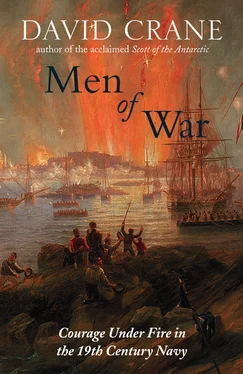The new Sir Charles might well have been right – ‘Oct 2’, the wonderfully named Derbyshire Coroner Charnel Bateman wrote in his accounts, ‘Willesley to view the body of Sir Charles Hastings Bart, who shot himself, being at the time in a state of temporary derangement, 21 miles £1.15s 9d.’ – but there was certainly nothing insane about the man who had made his will only months before. ‘I desire my body may be opened after my death,’ he declared, with the same robust, pagan instincts that made him so contemptuous that Bonaparte should have surrendered rather than fallen on his sword,
and buried without a coffin upon the Grove Hill on a spot marked by me, wrapped up in either woollen, oil cloth or any such perishable materials as will keep my body together until deposited in my grave by six of my most deserving poorest labourers to whom one pound will be given … and several acorns to be planted over my grave that one good tree may be chosen [the rusting iron railings still surround a tree near where Willesley Hall once stood] and preserved and that I may have the satisfaction of knowing that after my death my body may not be quite useless but serve to rear a good English Oak.
The same mixture of singularity, clarity and generosity runs through the rest of the will, and if Sir Charles Hastings died insane, then he had probably lived that way too. There is a curious – and very Hastings – codicil disinheriting his elder son in favour of Frank should Charles ever employ their old steward again, but the clause that most affected his estranged favourite – and transformed his bargaining power with his Greek masters – came right at the beginning.
As my youngest son Frank Hastings has been provided for by a clause in the Marriage Settlement I shall entrust him to the care of his Mother and Brother who will act towards him as he behaves and I grant him my blessing and entire forgiveness … I leave to my eldest son Charles Hastings five thousand pounds to enable him to pay his brother that sum due to him by the Marriage Settlement.
‘I have written three letters to my brother,’ Charles told his mother in that same letter from Geneva, ‘in which I urge in the kindest and strongest manner I can his immediate return to England – & have desired him to draw on me for any sums of money he may want. The 3 letters go by different channels, & I think safe one’s [sic].’
There is no mention of his father’s death in Frank’s journal – although there is a copy of the will among his papers – but if it did reach him before the end of the year his brother’s plea went ignored. It seems likely in fact that Charles’s letters did not catch up with him until well into the next year, because by the end of October 1823 he had left Hydra for Athens, sailing north via Corinth with another disenchanted product of the Royal Navy, Byron’s secretary, imitator, traducer and future biographer, Edward John Trelawny.
It says something about the diversity of philhellene life that two men as diametrically opposed in character and ambition as Trelawny and Hastings could find themselves on the same side, let alone in the same boat. They had entered the navy as boys in the same year, but whereas Hastings had served in the Neptune at Trafalgar, Trelawny – to his bitter regret – had missed out on the battle, beginning a downward spiral of resentments and failures that was made bearable only by a fantasy existence of sub-Byronic adventures that he half came to believe in himself.
There was no shortage of fabulists among philhellene volunteers, but what set Trelawny apart was his genius for co-opting others into his fantasy world. At the end of the Napoleonic Wars he had found himself in the same position as thousands of other unemployed lieutenants, but not even a humiliating marriage and divorce could keep him down, and in 1822, armed with little more than his dramatic good looks and a genius for story-telling, he succeeded in ‘bamming’ and talking his way into Byron’s Pisan circle in time to preside at the cremation of Shelley’s drowned corpse on the beach near Livorno.
It had seemed axiomatic to the Byron circle that Trelawny should fill the role – hadn’t he, after all, burned the body of his Eastern child-bride after she had been attacked by a shark? – but while Byron remained fond enough of Trelawny to take him to Greece, the creature had soon outgrown his creator. He had crossed the Morea initially in order to report back on the political and military situation, but with every mile put between himself and Byron the old ties and loyalties had weakened, and long before Hydra Trelawny had resolved to throw in his lot with a man who was the antithesis of all that the dilatory Byron represented. ‘I am to be a kind of aide de camp to [Odyssesus Androutses],’ he proudly wrote to Mary Shelley in a characteristic blend of fact and fantasy. ‘The General gives me as many men as I choose to command, and I am to be always with him … I am habited exactly like Ulysses, in red and gold vest, with sheep-skin capote, gun, pistols, sabre, & a few dollars or doubloons; my early habits will be resumed, and nothing new, but dirt and privations, with mountain sleeping, are a good exchange for the parched desert, dry locusts and camels’ milk.’
Trelawny would not have known camel’s milk if he had taken a bath in it – the Wahhabi – Ottoman desert wars, though, were prominent among his fictional battle honours – but his whole life is such a triumph of imagination over reality that it would be pedantic to hold that against him. From the first time he had read a Byron poem he had modelled himself on the Byronic hero, and here at last was the chance for life to catch up with art, for reality finally to deliver among the crags and bandit lairs of Parnassus the excitements and notoriety that ten years of the navy or Bristol boarding houses had so signally failed to provide.
Trelawny’s hopes were to be realised, too – life was briefly, tardily but dramatically about to give him everything down to the statutory Byronic child-bride he craved – and even in embryo he was a riskily outlandish companion with whom to travel. He and Hastings had arrived at the Corinth isthmus on the eve of the formal capitulation of the citadel, and in the heightened tensions that always followed a surrender the mere appearance of anyone as theatrically exotic as ‘Greek’ or ‘Turk’ Trelawny was enough to get the pair of them almost shot as spies.
It cannot have escaped Hastings, however, as they picked their way through the whitening bones of Dramali’s men and horses – 10,000 of them, he reckoned – and crossed for Athens, that for all his absurd posturing Trelawny was probably closer to the philhellene ‘type’ than he was himself. For the best part of two years Hastings had railed against Greek ingratitude, but with only one or two exceptions he remained as much a loner in volunteer company – coldly remote with his own countrymen, contemptuously suspicious of ‘ soi disant ’ French ‘experts’, and perfectly ready, in the face of Jarvis’s American vulgarity, to enforce a proper respect at the end of a duelling pistol if necessary.
There was as ever, though, a resilience about Hastings that kept him going, and with the imminent promise of ‘English gold’ he was no sooner in Athens than he was again writing to exhort Byron to prevent the money falling into a bottomless Greek sink. In the months since his first letter nothing had occurred to make him change his mind, but he had seen enough of the country’s politics to know that with every snout in the trough – as he elegantly put it – it was going to be hard enough to persuade the Greeks to finance a single steamship, let alone a fleet, if they had control of their own gold.
£20,000, that was all he needed – all Greece needed if she was ‘yet to be saved’ – and for once Hastings seemed lucky in his timing. ‘Trelawny gave a dinner to Goura’ – just about the basest of all the Greek leaders – he noted on 13 December, exultant after hearing that Byron and Colonel Napier, the Resident on Cephalonia and a soldier with a distinguished past and a sinful future, had at last ‘approved’ his plan: ‘… in the middle Mr Finlay arrived … Mr Finlay is quite a young man – he has studied in Germany & pleases me much … Mr Brown informs me by letter that he is likely to return to England & I may get a steamer – I hope to God he may succeed and in that case it is not impossible I may be named to the command of her if so my destruction … of the Turkish fleet must ensue in the summer.’
Читать дальше











